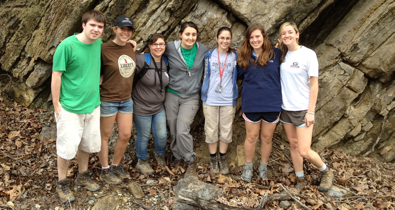
This time, like all times, is a very good one, if we but know what to do with it.
Ralph Waldo Emerson

This time, like all times, is a very good one, if we but know what to do with it.
Ralph Waldo Emerson
Should I Go to College?
7 April 2012
On the last episode (#71) of Build and Analyze, Marco Arment and Dan Benjamin discussed whether college was necessary. Marco fielded a listener’s question about whether the choice of a college mattered for a career, and he went on to the larger question of whether one should go to college at all, especially for someone interested in programming and development. I agree with most of what Marco and Dan said, but there is another way to think about the whole question.
In full disclosure, I am a geology professor at a research university. Even so, I view myself primarily as a geologist, and secondarily as a professor.
Going to college is about getting an education, not job training. For that, there are plenty of other options. If you’re thinking about college in terms of job training, you’re thinking about college too narrowly, and you’ll miss out on what can be a great experience.
More than anything, college can help you understand how to think and how to go about understanding the world you live in. It is easy to get trapped in our daily world and forget that there are different ways of approaching what we face every day. If you take a wide variety of courses (hint: I am a big fan of liberal education), and you pay attention in them, you’ll realize that an artist, a writer, a scientist, a businessperson, and a journalist all have different sets of assumptions about the world. You may also later realize that knowing these ways of thinking can help you understand the people around you, people you may have to work for or with. You may also find that knowing these other ways of thought can help you in your own work and life, often at unexpected times.
Even though college is not about getting a job, it can help, mostly by providing you with opportunities. Making these opportunities happen, though, is your job, and here are several things you can do.
Take a wide range of classes. Think about Steve Jobs’ story of his calligraphy class: classes have an odd way of resurfacing in your life. That class you can’t imagine being important later on might well be the key at some critical moment, and you have no way of knowing right now whether a course will matter later. Some of those classes may well be forgettable, but that’s just life: not every moment has remarkable significance, whether inside the classroom or outside of it. You have to trust that at least some of your classes will help you later in your life.
Go to a school with small classes, or find those small classes if you’re at a large school. You need to interact with your professors and with your fellow students. You can’t do that in any meaningful way in a 500-seat auditorium, or even in a 50-seat classroom. If your classes feel like you are watching TV, they are too large: they should feel more like a conversation. Learning takes involvement, and staring at a presentation from a hundred feet away is too passive.
Do more than your classwork. Classes are the minimum college experience, and you’ll find few opportunities later on if all you’ve done is take classes. Volunteer, do an internship, or get some research experience. Get involved. College is about experiences, not just in new ways of thinking, but in new ways of doing. Going beyond the classwork does several things. It gives you experience, it distinguishes you from everyone else, and it will help you discover what you love. Finding this passion is what will help you move forward, because the passion is what will carry you through the difficult times.
If you think college is a waste of time, skip it, take time off, or drop out. It’s too expensive otherwise, and college shouldn’t be a holding pattern until you have a job. I’ve seen plenty of students who take time off, but flourish when they come back and understand what college really has to offer. Some excel without the degree, and Bill Gates, Steve Jobs, and Mark Zuckerberg are all well-known examples. But remember that great things didn’t just happen to them. They made them happen with a mixture of talent and timing. Don’t assume that because a lack of a degree didn’t hinder them, it won’t necessarily hurt you. Have a plan, a realistic plan.
It’s a natural question to ask whether going to a particular college, or going to any college, will get you a job. The answer is no. College isn’t going to get you a job, but for many people, college provides the opportunity for learning and exploration, and it’s those things that will help you get a job. If you’re already convinced that college is a waste of time and won’t provide those opportunities, you probably shouldn’t go, either because you’re not being open to the possibilities that college can present or you’ve found another way. You know which it is.
Comments? I’m forktail on Twitter.